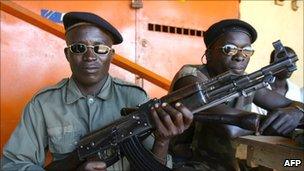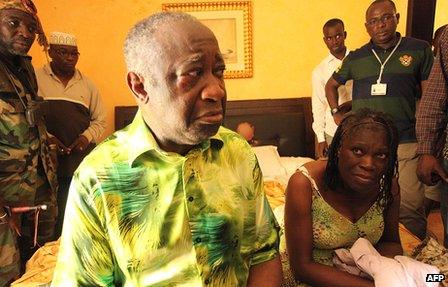Ivory Coast profile - Timeline
- Published
A chronology of key events
1842 - France imposes protectorate over coastal zone.
1893 - Ivory Coast made into a colony.
1904 - Ivory Coast becomes part of the French Federation of West Africa.
1944 - Felix Houphouet-Boigny, who later to become Ivory Coast's first president, founds a union of African farmers, which develops into the inter-territorial African Democratic Rally and its Ivorian section, the Ivory Coast Democratic Party.
1958 - Ivory Coast becomes a republic within the French Community.
Independence
1960 - France grants independence under President Felix Houphouet-Boigny. He holds power until he dies in 1993.
1990 - Opposition parties legalised; Houphouet-Boigny wins Ivory Coast's first multiparty presidential election, beating Laurent Gbagbo of the Ivorian Popular Front.
1993 - Henri Konan Bedie becomes president following the death of Houphouet-Boigny.
1995 October - Mr Bedie is re-elected in a ballot that is boycotted by opposition parties in protest at restrictions imposed on their candidates.
1999 July - Alassane Ouattara, a Muslim, leaves job at International Monetary Fund and returns to run for president in 2000; his plan to challenge Bedie splits country along ethnic and religious lines.
Coup
1999 December - President Bedie is overthrown in military coup, replaced by General Robert Guei.
2000 October - General Guei proclaims himself president after announcing he has won presidential elections, but is forced to flee in the wake of a popular uprising and is replaced by his challenger Laurent Gbagbo.
Fighting erupts between President Gbagbo's mainly southern Christian supporters and followers of his main opponent Alessandre Ouattara, who are mostly Muslims from the north.
2001 March - President Gbagbo and Mr Ouattara meet and agree to work towards reconciliation.

The 2002-3 civil war left Ivory Coast divided for several years
2002 August - Ouattara's RDR party given four ministerial posts in new government.
Rebellion
2002 September - Mutiny in Abidjan by soldiers unhappy at being demobilised grows into full-scale rebellion, with Ivory Coast Patriotic Movement rebels seizing control of the north.
2003 March - Political parties, rebels agree on new government to include nine members from rebel ranks. Consensus prime minister, Seydou Diarra, is tasked with forming cabinet.
UN deploys
2004 March - Deadly clashes during crackdown on opposition rally against President Gbagbo in Abidjan. First contingent of UN peacekeeping force deployed.
2004 November - Ivorian air force attacks rebels; French forces enter the fray after nine of their soldiers are killed in an air strike. Violent anti-French protests ensue. UN imposes arms embargo.
2005 April - After talks in South Africa the government and rebels declare an "immediate and final end" to hostilities.
2005 June - Massacres in western town of Duekoue: President Gbagbo says more than 100 people were killed, but contradicts widely-held view that ethnic rifts lay behind violence.
2005 October - Planned elections are shelved as President Gbagbo invokes a law which he says allows him to stay in power. The UN extends his mandate for a further year.
2006 September - Government resigns over a scandal involving the dumping of toxic waste in Abidjan. Fumes from the waste kill three people and make many more ill.
Power-sharing deal
2007 March - Government and New Forces rebels sign a power-sharing peace deal, mediated by Burkina Faso. Under the deal, New Forces leader Guillaume Soro is named prime minister.
2007 December - Rebel, government soldiers pull back from front-line positions as part of process to reunite country.
2008 April - President Gbagbo cancels custom duties after a second day of violent protests against rising food costs.
2009 May - Former rebels hand over 10 northern zones to civilian administrators, as part of the process of returning the northern part of the country to state control.
President Ouattara takes over
2010 December - Election commission declares Mr Ouattara the winner of presidential election run-off. Mr Gbagbo refuses to accept result, and dispute between the two camps soon escalates into violence.

Images of Laurent Gagbo's capture went around the world April 2011
2011 April - Alassane Ouattara's forces capture Laurent Gbagbo, who is handed over to the International Criminal Court in The Hague in November to face charges of crimes against humanity.
2011 September - Truth, Reconciliation and Dialogue Commission - aimed at forging unity after post-election violence that left about 3,000 people dead and 500,000 displaced - is launched.
2011 December - Parliamentary elections. President Ouattara and his allies secure a majority. Followers of Laurent Gbagbo boycott the vote.
2014 April - UN Security Council lifts embargo on Ivory Coast's diamond trade.
Al-Qaeda attacks
2016 March - Al-Qaeda jihadists attack the beach resort of Grand Bassam, near Abidjan, killing 18 people. The attack follows similar assaults on hotels in the capitals of Mali and Burkina Faso in recent months.
2016 September - Constitutional referendum approves changes that Alassane Outtara say allow him to stand for a third term.
2017 January - President Ouattara sacks army, policy and gendarmes chiefs over two-day army mutiny in various cities over unpaid wages.
2017 September - An environmental group says the chocolate industry is causing massive illegal deforestation, fuelling a catastrophic decline in wildlife.
2019 January - The International Criminal Court acquits Ivory Coast ex-president Laurent Gbagbo of charges of crimes against humanity over violence following the 2010 election.
2020 November - Alassane Ouatarra is re-elected for a controversial third term. The opposition boycott the poll.